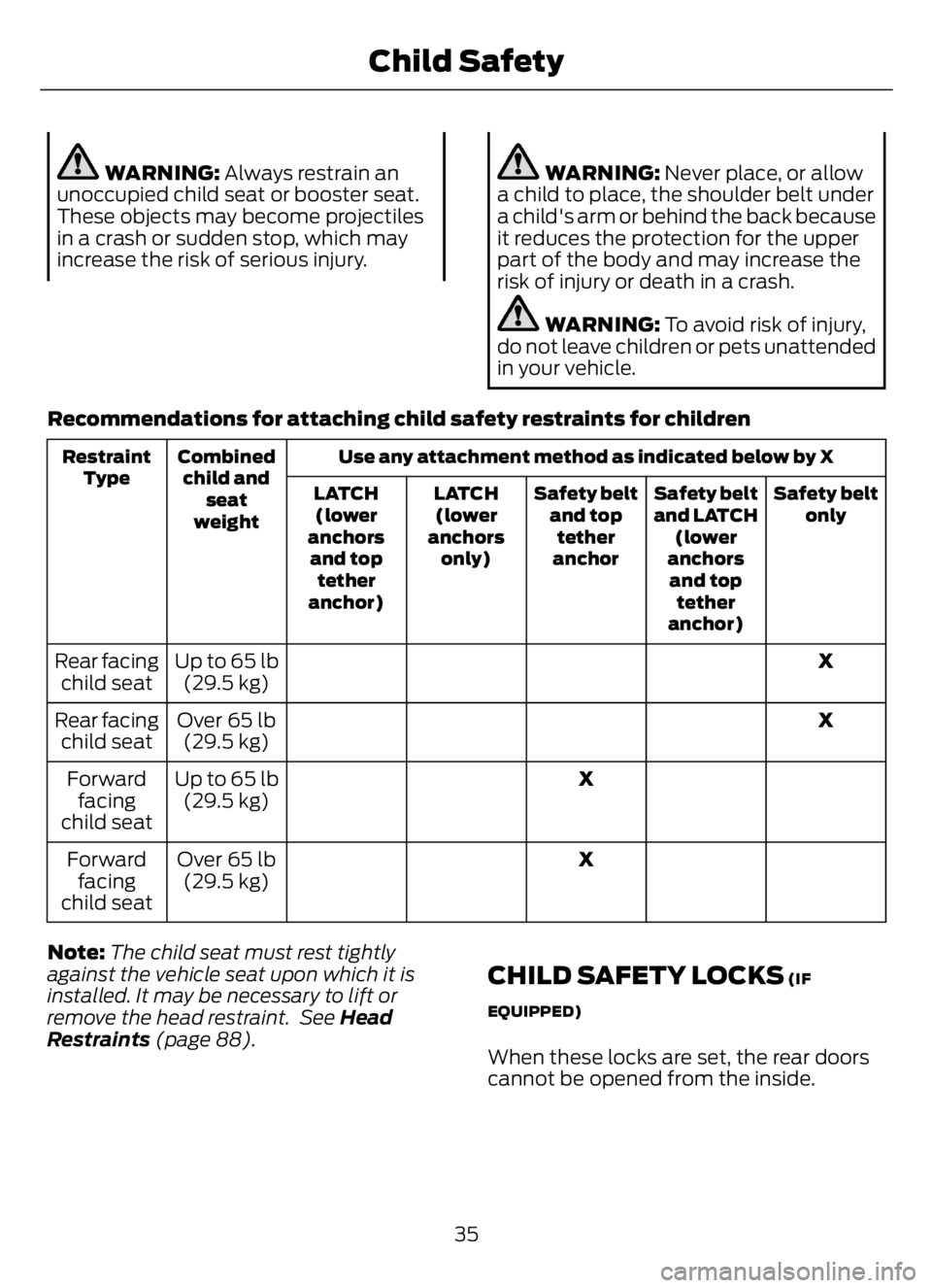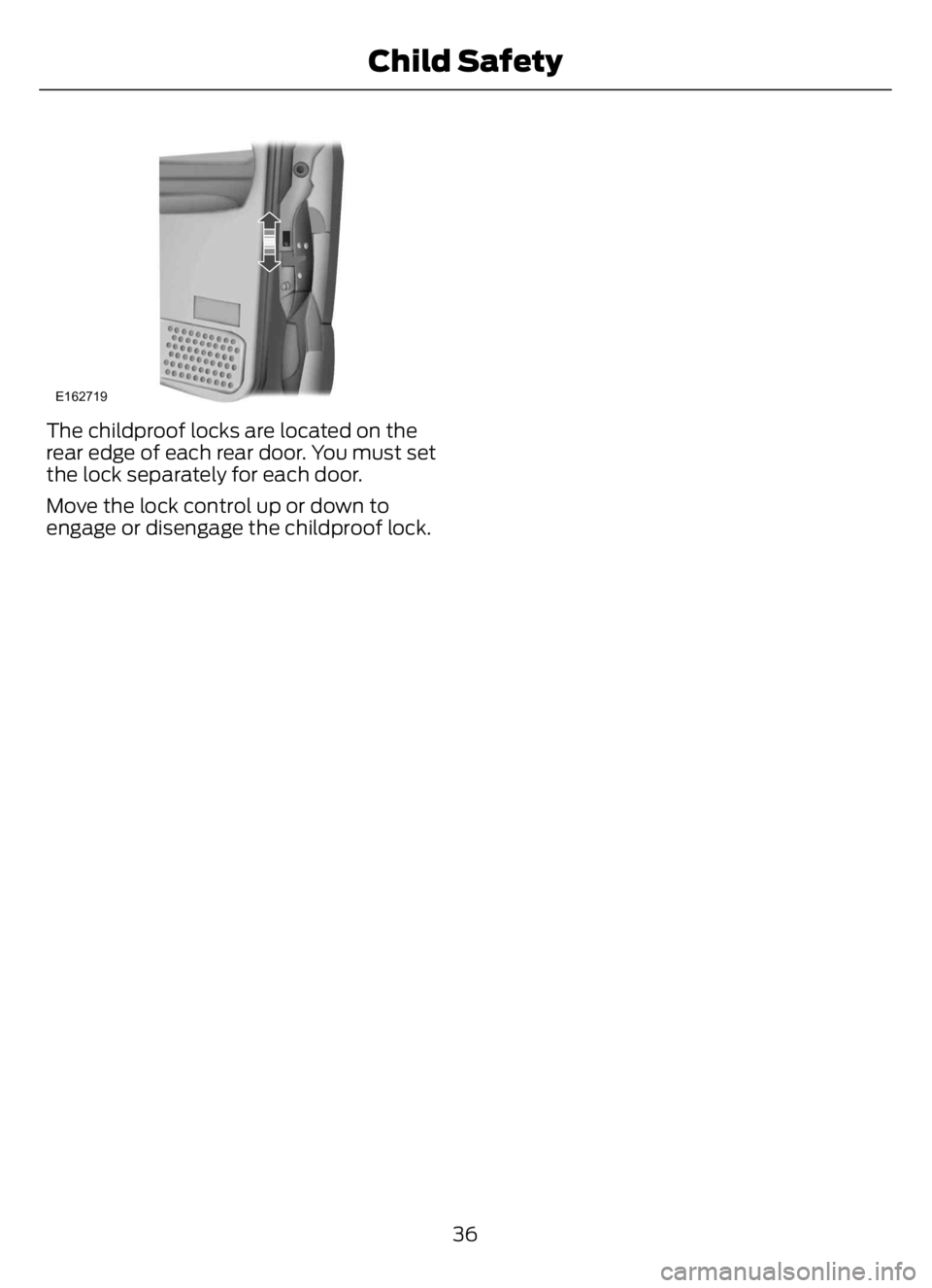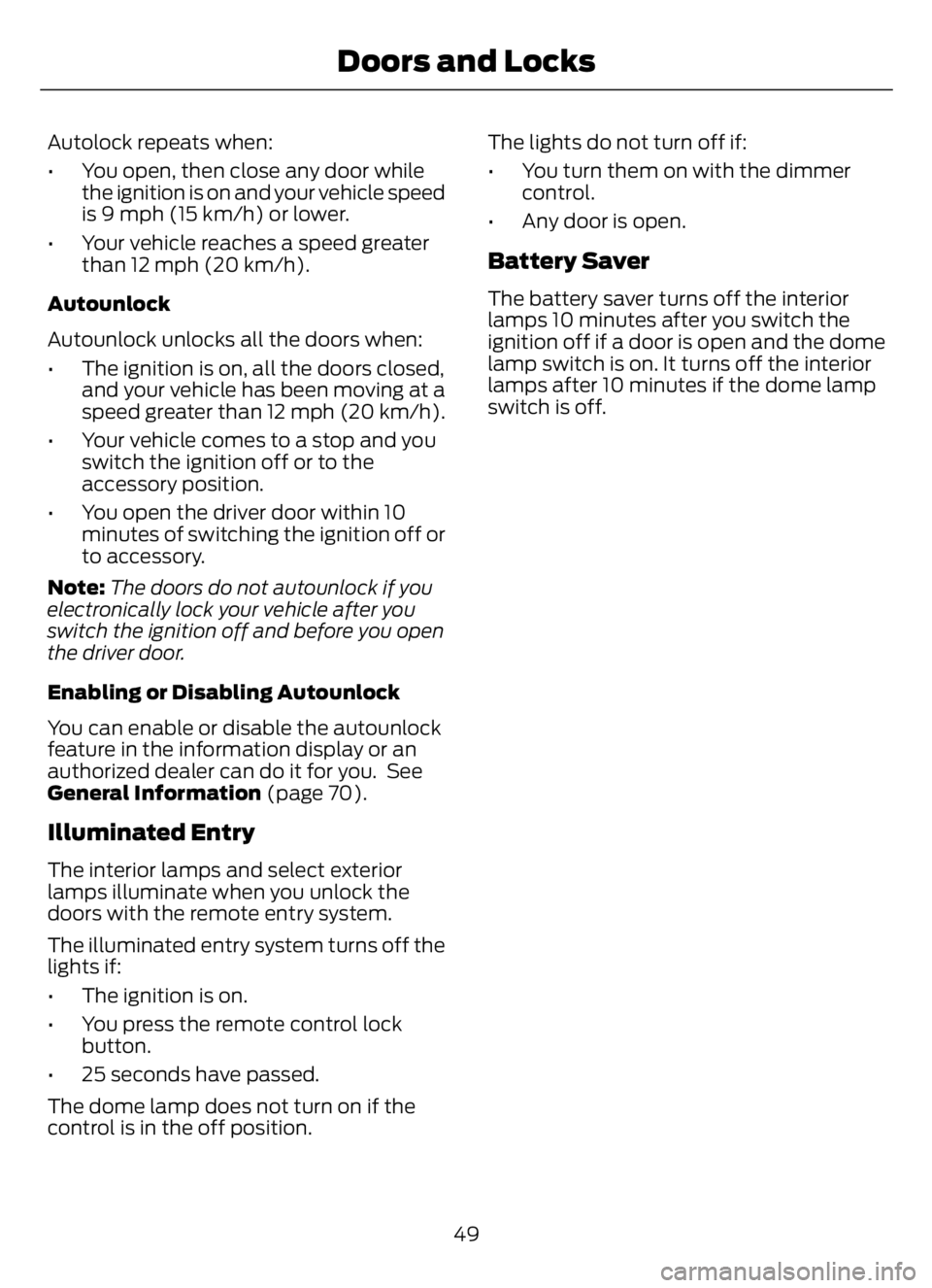2023 FORD F650/750 door lock
[x] Cancel search: door lockPage 5 of 378

Introduction
About This Manual ..........................................7
Symbols Glossary ..........................................10
Data Recording ................................................13
Perchlorate ........................................................17
Ford Credit .........................................................17
Replacement Parts Recommendation
............................................................................1 7
Special Notices ...............................................18
Mobile Communications Equipment
...........................................................................1 9
Export Unique Options ...............................20
Federal Highway Administration
Regulation ...................................................20
Entering, Exiting or Climbing on This
Vehicle ...........................................................20
Environment
Protecting the Environment .......................21
Noise Pollution Control ................................21
At a Glance
Instrument Panel ...........................................23
Child Safety
General Information .....................................24
Installing Child Restraints ..........................26
Booster Seats .................................................32
Child Restraint Positioning ........................34
Child Safety Locks ........................................35
Seatbelts
Principle of Operation ..................................37
Fastening the Seatbelts .............................38
Seatbelt Height Adjustment ......................41
Seatbelt Warning Lamp and Indicator
Chime ............................................................42
Seatbelt Reminder ........................................42
Child Restraint and Seatbelt
Maintenance ...............................................44
Seatbelt Extensions .....................................44
Keys and Remote Controls
General Information on Radio
Frequencies .................................................45
Remote Control .............................................46
Replacing a Lost Key or Remote Control
...........................................................................47
Doors and Locks
Locking and Unlocking ...............................48
Security
Passive Anti-Theft System .......................50
Steering Wheel
Adjusting the Steering Wheel ....................51
Cruise Control - Vehicles With: Adaptive
Cruise Control ..............................................51
Cruise Control - Vehicles With: Cruise
Control ...........................................................51
Information Display Control ......................52
Horn ....................................................................52
Wipers and Washers
Windshield Wipers ........................................53
Windshield Washers ....................................53
Lighting
General Information .....................................54
Lighting Control .............................................54
Autolamps .......................................................55
Instrument Lighting Dimmer ....................55
Headlamp Exit Delay ...................................55
Daytime Running Lamps - Vehicles With:
Daytime Running Lamps (DRL) ..........56
Daytime Running Lamps - Vehicles With:
Configurable Daytime Running Lamps
..........................................................................5 6
Automatic High Beam Control ................56
Direction Indicators .......................................57
Interior Lamps .................................................57
1
Table of Contents
Page 15 of 378

E162384E162384Air conditioning system
E231157
Air conditioning system lubricant
type
Anti-lock braking system
Avoid smoking, flames or sparks
Battery
Battery acid
Brake fluid - non petroleum
based
Brake system
E270480
Brake system
E139223E139223Cabin air filter
Check fuel cap
Child safety door lock or unlock
Child seat lower anchor
E141E141128128Child seat tether anchor
E71340
Cruise control
Do not open when hot
Engine air filter
Engine coolant
Engine coolant temperature
Engine oil
Explosive gas
Fan warning
E71880
Fasten seatbelt
E231160
Flammable
E67017
Front airbag
Front fog lamps
Fuel pump reset
Fuse compartment
Hazard flashers
Heated rear window
11
Introduction
Page 39 of 378

WARNING: Always restrain an
unoccupied child seat or booster seat.
These objects may become projectiles
in a crash or sudden stop, which may
increase the risk of serious injury.WARNING: Never place, or allow
a child to place, the shoulder belt under
a child's arm or behind the back because
it reduces the protection for the upper
part of the body and may increase the
risk of injury or death in a crash.
WARNING: To avoid risk of injury,
do not leave children or pets unattended
in your vehicle.
Recommendations for attaching child safety restraints for children
Use any attachment method as indicated below by X Combined
child and
seat
weight Restraint
Type
Safety belt
only Safety belt
and LATCH
(lower
anchors
and top
tether
anchor) Safety belt
and top
tether
anchor LATCH
(lower
anchors
only) LATCH
(lower
anchors
and top
tether
anchor)
X Up to 65 lb
(29.5 kg) Rear facing
child seat
X Over 65 lb
(29.5 kg) Rear facing
child seat
X Up to 65 lb
(29.5 kg) Forward
facing
child seat
X Over 65 lb
(29.5 kg) Forward
facing
child seat
Note:The child seat must rest tightly
against the vehicle seat upon which it is
installed. It may be necessary to lift or
remove the head restraint. See Head
Restraints (page 88).
CHILD SAFETY LOCKS (IF
EQUIPPED)
When these locks are set, the rear doors
cannot be opened from the inside.
35
Child Safety
Page 40 of 378

E162719
The childproof locks are located on the
rear edge of each rear door. You must set
the lock separately for each door.
Move the lock control up or down to
engage or disengage the childproof lock.
36
Child Safety
Page 49 of 378

GENERAL INFORMATION ON
RADIO FREQUENCIES
This device complies with Part 15 of the
FCC Rules and with Industry Canada
license-exempt RSS standard(s).
Operation is subject to the following two
conditions: (1) This device may not cause
harmful interference, and (2) This device
must accept any interference received,
including interference that may cause
undesired operation.
WARNING: Changes or
modifications not expressively approved
by the party responsible for compliance
could void the user's authority to operate
the equipment. The term "IC:" before the
radio certification number only signifies
that Industry Canada technical
specifications were met.
The typical operating range for your
transmitter is approximately 33 ft (10 m).
Vehicles with the remote start feature will
have a greater range.
One of the following could cause a
decrease in operating range:
• Weather conditions.
• Nearby radio towers.
• Structures around the vehicle.
• Other vehicles parked next to your
vehicle.
The radio frequency used by your remote
control can also be used by other radio
transmitters, for example amateur radios,
medical equipment, wireless headphones,
wireless remote controls, cell phones,
battery chargers and alarm systems. If the
frequencies are jammed, you will not be
able to use your remote control. You can
lock and unlock the doors with the key.
Note:Make sure to lock your vehicle before
leaving it unattended.Note:If you are in range, the remote control
will operate if you press any button
unintentionally.
Note:The remote control contains sensitive
electrical components. Exposure to moisture
or impact may cause permanent damage.
Intelligent Access (If Equipped)
The system uses a radio frequency signal
to communicate with your vehicle and
authorize your vehicle to unlock when one
of the following conditions are met:
• You activate the front exterior door
handle switch.
• You press the luggage compartment
button.
• You press a button on the transmitter.
If excessive radio frequency interference
is present in the area or if the transmitter
battery is low, you may need to
mechanically unlock your door. You can
use the mechanical key blade in your
intelligent access key to open the driver
door in this situation. See Remote
Control (page 46).
45
Keys and Remote Controls
Page 50 of 378

REMOTE CONTROL
E195660
Note:If there are problems with the remote
entry system, make sure to take all remote
entry transmitters with you to an authorized
dealer in order to aid in troubleshooting the
problem.
Note:If your vehicle is fitted with the
E-Guard Cargo Protection System™, the
remote transmitter unlock command only
unlocks the front doors. The side or rear
cargo doors can only be unlocked from
outside your vehicle using the key.
Changing the Remote Control
Battery
WARNING: Keep batteries away
from children to prevent ingestion.
Failure to follow this instruction could
result in personal injury or death. If
ingested, immediately seek medical
attention.
WARNING: If the battery
compartment does not securely close,
stop using the remote control and
replace it as soon as possible. In the
meantime, keep the remote control away
from children. Failure to follow this
instruction could result in personal injury
or death.
The remote control uses one coin-type
three-volt lithium battery CR2032 or
equivalent.
E107998
Make sure that you dispose of
old batteries in an
environmentally friendly way.
Seek advice from your local authority
about recycling old batteries.
E195662
1. Twist a thin coin in the slot of the
transmitter near the key ring to remove
the battery cover.
Note:Do not remove the rubber cover and
circuit board from the front housing of the
remote entry transmitter.
46
Keys and Remote Controls
Page 52 of 378

LOCKING AND UNLOCKING
You can use the power door lock control
or the remote control to lock and unlock
your vehicle.
Power Door Locks (If Equipped)
The power door lock control is on the driver
and front passenger door panels.
ABE163049
Unlock. A
Lock. B
Remote Control (If Equipped)
Unlocking the Doors (Two-Stage
Unlock)
E138629
Press the button to unlock the
driver door.
Press the button again within
three seconds to unlock all doors. The
direction indicators flash.
Press and hold both the lock and unlock
buttons on the remote control for four
seconds to disable or enable two-stage
unlocking. Disabling two-stage unlocking
allows all vehicle doors to unlock with one
press of the button. The direction
indicators flash twice to indicate a change
to the unlocking mode. The unlocking
mode applies to the remote control.Locking the Doors
E138623
Press the button to lock all the
doors. The direction indicators
flash.
Press the button again within three
seconds to confirm that all the doors lock.
The doors lock again, the horn sounds and
the direction indicators flash if all the doors
lock.
Mislock
If any door is open or if the hood is open on
vehicles with an anti-theft alarm or remote
start, the horn sounds twice and the lamps
do not flash.
Smart Unlocks (If Equipped)
This feature helps prevent you from locking
yourself out of your vehicle if your key is
still in the ignition.
When you open the driver door and lock
your vehicle with the power door lock
control, all the doors lock, then unlock if
your key is still in the ignition.
You can still lock your vehicle with the key
in the ignition by:
• Using the manual lock on the door.
• Locking the driver door with a key.
• Using the lock button on the remote
control.
Autolock (If Equipped)
Autolock locks all the doors when:
• All doors closed.
• The ignition is on.
• You shift into any gear putting your
vehicle in motion.
• Your vehicle reaches a speed greater
than 12 mph (20 km/h).
48
Doors and Locks
Page 53 of 378

Autolock repeats when:
• You open, then close any door while
the ignition is on and your vehicle speed
is 9 mph (15 km/h) or lower.
• Your vehicle reaches a speed greater
than 12 mph (20 km/h).
Autounlock
Autounlock unlocks all the doors when:
• The ignition is on, all the doors closed,
and your vehicle has been moving at a
speed greater than 12 mph (20 km/h).
• Your vehicle comes to a stop and you
switch the ignition off or to the
accessory position.
• You open the driver door within 10
minutes of switching the ignition off or
to accessory.
Note:The doors do not autounlock if you
electronically lock your vehicle after you
switch the ignition off and before you open
the driver door.
Enabling or Disabling Autounlock
You can enable or disable the autounlock
feature in the information display or an
authorized dealer can do it for you. See
General Information (page 70).
Illuminated Entry
The interior lamps and select exterior
lamps illuminate when you unlock the
doors with the remote entry system.
The illuminated entry system turns off the
lights if:
• The ignition is on.
• You press the remote control lock
button.
• 25 seconds have passed.
The dome lamp does not turn on if the
control is in the off position.The lights do not turn off if:
• You turn them on with the dimmer
control.
• Any door is open.
Battery Saver
The battery saver turns off the interior
lamps 10 minutes after you switch the
ignition off if a door is open and the dome
lamp switch is on. It turns off the interior
lamps after 10 minutes if the dome lamp
switch is off.
49
Doors and Locks